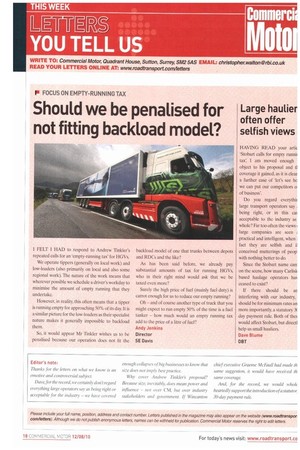P FOCUS ON EMPTY-RUNNING TAX
Page 18

If you've noticed an error in this article please click here to report it so we can fix it.
Should we be penalised for not fitting backload model?
I FELT I HAD to respond to Andrew Tink lees repeated calls for an 'empty-running tax' for HGVs.
We operate tippers (generally on local work) and low-loaders (also primarily on local and also some regional work). The nature of the work means that wherever possible we schedule a driver's workday to minimise the amount of empty running that they undertake.
However, in reality, this often means that a tipper is running empty for approaching 50% of its day. It is a similar picture for the low-loaders as their specialist nature makes it generally impossible to backload them.
So, it would appear Mr linkler wishes us to be penalised because our operation does not lit the backload model of one that trunks between depots and RDCs and the like?
As has been said before, we already pay substantial amounts of tax for running HGVs, who in their right mind would ask that we be taxed even more?
Surely the high price of fuel (mainly fuel duty) is carrot enough for us to reduce our empty running?
Oh — and of course another type of truck that you might expect to run empty 50% of the time is a fuel tanker — how much would an empty running tax add to the price of a litre of fuel?
Andy Jenkins Director
SE Davis








































































































































